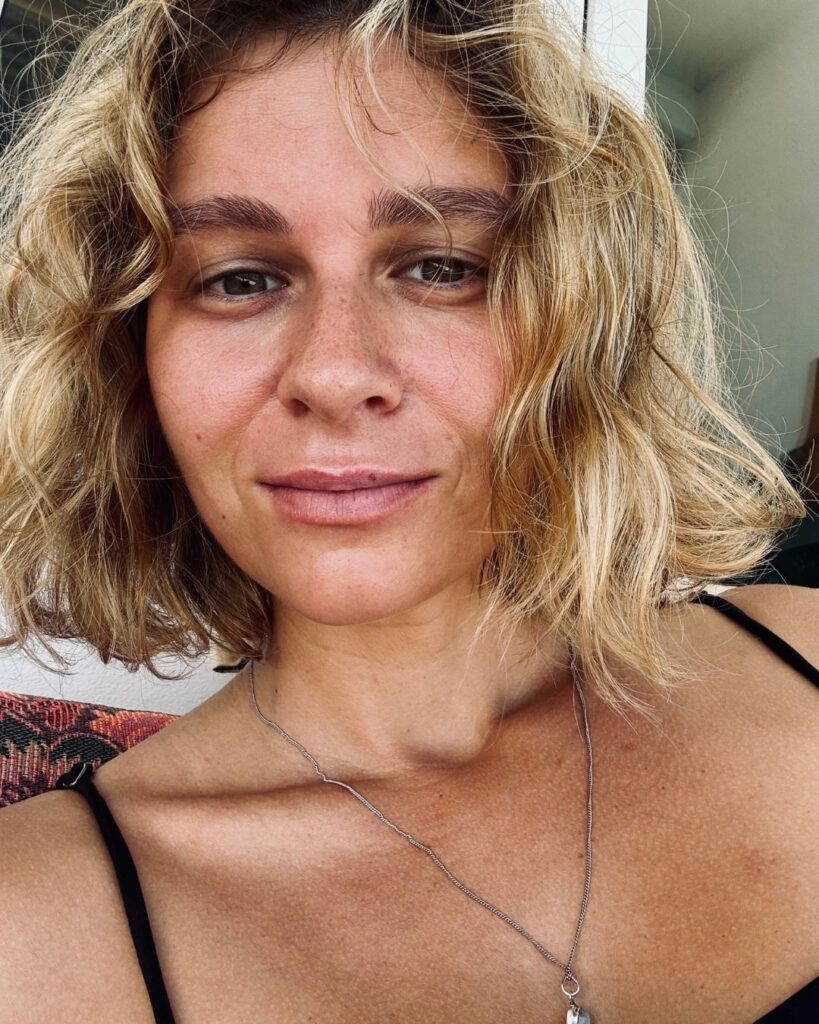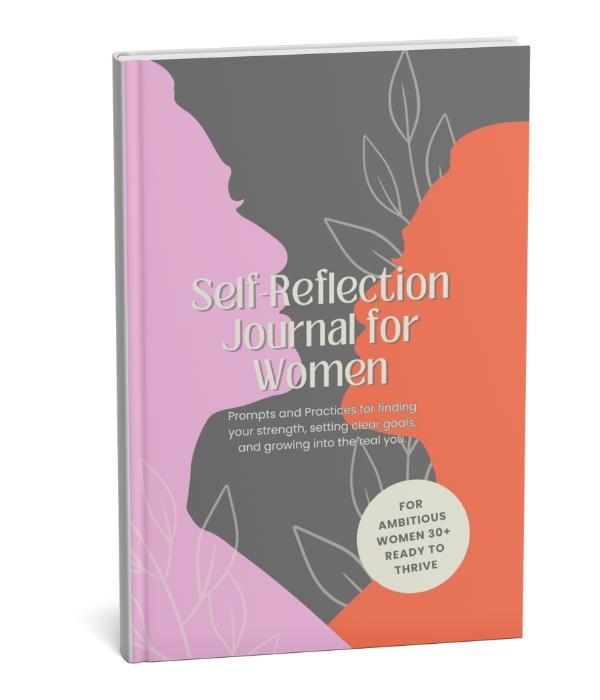Journey Map
Perfectionism and people pleasing nearly destroyed my sense of self.
A few days ago, I received a message that would have crushed the old me. A former co-worker wrote to tell me I should delete my latest Instagram post – a makeup-free selfie in natural sunlight, hair messy from the wind. “You’re one of the most beautiful people I follow,” she said, “but please delete this photo. The lighting ages you, and you look ugly here.“
The irony? I had captioned that photo with “because perfect is overrated anyway,” celebrating those simple, unfiltered moments of life—tangled hair and bare feet in the grass.
I stared at her message for a moment, then typed back: “Whatever you do, I look like I look 😊” No defense, no explanation, no apology. Just acceptance.
But as I hit send, I couldn’t help thinking about how devastated the old version of me would have been. How much pain that message would have caused, how quickly I would have deleted the photo, and how I probably would have stopped posting anything candid for months afterward.
That thought inspired me to write this, because if you’re reading this and struggling with the exhausting cycle of perfectionism and people pleasing, I want you to know that freedom is possible. You don’t need to be perfect every moment, and you absolutely don’t need to please everyone around you. You are enough, exactly as you are.

When Perfectionism and People Pleasing Became My Prison
I became a perfectionist before I even knew what the word meant. As a young child, I quickly learned that the only way to capture my busy parents’ attention was to be flawless. If I brought home perfect grades, completed every school project, and behaved exactly as a “good girl” should, then maybe – just maybe – I could earn a moment of their focus.
When I wasn’t perfect, when I acted like a normal child who needed attention or got upset, I was simply rejected. The message was crystal clear: conditional love required constant performance.
Research shows that perfectionism and people pleasing often develop together in childhood.
Research shows that perfectionism often develops in childhood when children learn that their worth depends on meeting impossibly high standards. What I didn’t realize then was how this survival strategy would follow me into adulthood, shaping every relationship and decision I made.
The people pleasing came hand in hand with perfectionism. I was that desperate little girl who needed attention from anywhere she could get it. If I couldn’t earn it from my parents, maybe I could get it from friends, teachers, or anyone who would notice me. I found myself agreeing to things I didn’t want to do, becoming a slave to other people’s expectations, feeling crushing guilt whenever I dared to say no.
The Physical and Emotional Toll
By my twenties, the weight of constantly performing was unbearable. I was overworking at my job, trying to execute every task flawlessly. In my personal life, I prioritized everyone else’s needs while treating my own as an afterthought. My friends’ happiness, my boyfriend’s preferences, my family’s expectations – they all came before my own well-being.
I was emotionally exhausted and completely lost. I didn’t even know who I really was anymore because I’d spent so many years molding myself to fit what others wanted. The anxiety was constant, the fear of disappointing someone perpetually looming over me.
Scientists have found that perfectionism is strongly linked to increased rates of anxiety, depression, and emotional exhaustion. My body was telling me what my mind refused to acknowledge: this way of living was unsustainable.
The Breaking Point That Changed Everything
The wake-up call came through a relationship with someone I’ll call James. He was older, confident, and I looked up to him as an authority figure. We spent most of our time in expensive restaurants and trendy bars – always doing what he wanted, always living by his terms.
I said yes to everything. Every lavish dinner, every weekend party, every expensive outing that drained both my wallet and my energy. I bought clothes I couldn’t afford to look perfect, suffered through countless hangovers, and felt constantly overwhelmed. But I couldn’t say no because I was terrified of losing his approval.
The more I reflected on this pattern, the more I realized how miserable I was. This wasn’t who I wanted to be. I love social connection and fun, but what I really craved was self-knowledge, meaningful activities, sports, reading, traveling. I wanted to spend my money on hobbies that fulfilled me, not on maintaining an image that wasn’t even mine.
I had a choice: have an honest conversation with James about what I needed, or end the friendship. When I finally found the courage to set boundaries, our friendship didn’t survive the change. He continued living the same party-focused lifestyle while I completely transformed my priorities.
That loss was painful, but it was also liberating. For the first time, I was choosing my authentic self over other people’s expectations.

Understanding the Perfectionism and People Pleasing Connection
Psychological research reveals that perfectionism and people-pleasing are deeply interconnected, both rooted in a fear of not being good enough or loved conditionally. I began to see how I set impossibly high standards not just for myself, but for everyone around me. Just as I couldn’t forgive myself for failures, I couldn’t forgive my parents for not being the perfect parents I’d needed as a child.
That inner dissatisfaction with myself had turned into dissatisfaction with others, creating a cycle where I blamed them while actually blaming myself. Studies show that people-pleasing often develops as a trauma response, particularly in children who experience emotional neglect or inconsistent parenting. It’s essentially a survival mechanism that becomes deeply ingrained.
Learning to Say No (And Mean It)
My first step toward freedom was learning to say no -and I took this task very seriously. Every time I felt that familiar pull to agree when I actually disagreed, I forced myself to speak up. I even started counting these small victories.
I began contradicting my parents instead of staying silent when our opinions differed. The first time I did this, the relief was incredible. Not because I wanted to hurt them, but because I felt like a massive weight had been lifted from my chest. I was finally allowing my authentic voice to exist.
Research confirms that setting healthy boundaries is directly linked to improved self-esteem and mental health. Once I could say no, I began allowing myself to be imperfect. These two changes worked together, creating a foundation for genuine self-acceptance.
The Strategies That Actually Worked
Overcoming perfectionism and people pleasing required both boundary-setting and self-compassion.
The most powerful tool in overcoming perfectionism was learning to stop the negative self-talk. I became hyperaware of moments when I called myself unworthy, ugly, or inadequate. Instead, I started focusing on self-compassion, keeping notes on my phone about things I was proud of, celebrating small victories.
For people-pleasing, setting clear boundaries was essential. I had to define limits with my partner, parents, and friends – and then consistently enforce them. This wasn’t easy, and some relationships shifted or ended, but the ones that survived became deeper and more authentic.
Self-care became my priority, but not the Instagram version with candles and wine glasses. I mean real self-care: self-awareness, reading, journaling, and especially exercise. Working out three times a week became one of my favorite activities. After exercise, I feel positive, physically and mentally strong, and proud of my commitment to myself.
Working with the Inner Child
The most profound healing came from addressing my childhood wounds directly. I had to have honest conversations with my inner child—that desperate little girl who believed she was unlovable unless she performed perfectly.
Trauma-informed research shows that childhood emotional neglect often creates lasting patterns of self-worth being tied to external validation. I needed to tell that little girl that it wasn’t her fault, that she deserved love simply for existing, and that she was never forgotten.

What “Good Enough” Looks Like Now
I’ve learned to embrace balance instead of extremes. Before, I believed I had to be perfect or I was a complete failure. There was no middle ground, no room for human imperfection.
Now I understand that I don’t have to be perfect – I just have to show up and do my best with what I have in that moment.
I started drawing again, painting, writing. My first attempts weren’t masterpieces, but I did them anyway. I published my writing online despite my fear of criticism or appearing ordinary. The most important thing was creating, not creating perfectly.
The person who does nothing never improves, but the person who keeps trying grows every day. I’ve learned to be proud of myself at every small step, celebrating progress over perfection.
Handling the Perfectionist Voice
Perfectionistic thoughts still visit me sometimes, but I don’t let them overstay their welcome. I process these thoughts through journaling and mindfulness practices. Meditation has been particularly helpful in learning to observe my thoughts without being controlled by them.
Studies demonstrate that mindfulness-based approaches are highly effective for reducing perfectionist tendencies and building self-compassion.
Living with Self-Respect
Every day now, I wake up with genuine self-respect. I have routines and habits that support my growth. I cherish my friendships and enjoy social time, but when I need solitude, I communicate that openly without apologizing.
If you could see your past self who was struggling with these same issues, what would you tell them? I would say: “I love you and you are enough.” You have always been worthy of love, exactly as you are. This doesn’t mean becoming complacent, but rather not being afraid to take action from wherever you are right now.
My relationship with myself has changed completely. I love who I am, I take care of my needs, my thoughts are clear, and I know what my current goals are. I live in gentle harmony with myself and the world around me.
My journey beyond perfectionism and people pleasing taught me that authenticity matters more than approval.

Life After Perfectionism and People Pleasing
Today, when someone sends me a message telling me to delete a photo because I don’t look perfect enough, I can respond with kindness but without compromise. I can post that messy-haired, makeup-free selfie with genuine joy because I know my worth isn’t determined by other people’s approval.
Freedom from perfectionism and people pleasing feels like breathing freely after holding your breath for years. It’s the relief of no longer performing for love, no longer exhausting yourself trying to control how others perceive you.
Recent research shows that people who embrace “excellencism”—setting high but achievable goals and moving on once they’re met—perform better and experience less anxiety than perfectionists who never feel satisfied with their accomplishments.
You don’t need to be perfect. You don’t need to please everyone. The people who truly love you will accept your authentic self, messy hair and all. And for those who can’t? That says everything about them and nothing about your worth.
Your journey to freedom starts with one small step: believing you deserve better than the exhausting cycle of perfectionism and people-pleasing. Because you do deserve better. You deserve to be loved for who you are, not who you think you should be.
The world needs your authentic self, not another perfect performance. Trust me – I’ve tried both, and authenticity is infinitely more beautiful.














0 Comments